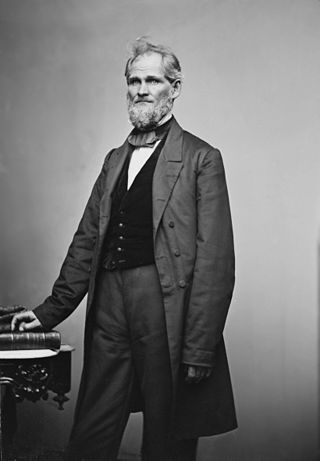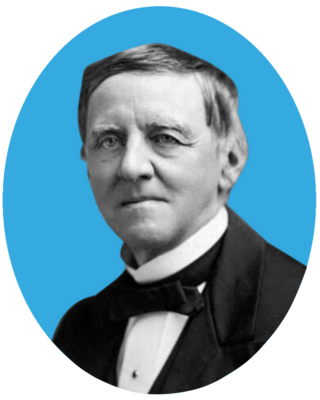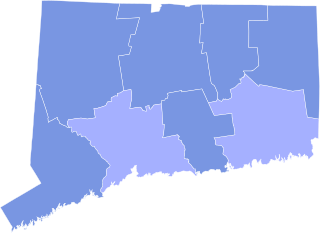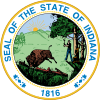
Thomas Andrews Hendricks was an American politician and lawyer from Indiana who served as the 16th governor of Indiana from 1873 to 1877 and the 21st vice president of the United States from March until his death in November 1885. Hendricks represented Indiana in the U.S. House of Representatives (1851–1855) and the U.S. Senate (1863–1869). He also represented Shelby County, Indiana, in the Indiana General Assembly (1848–1850) and as a delegate to the 1851 Indiana constitutional convention. In addition, Hendricks served as commissioner of the United States General Land Office (1855–1859). Hendricks, a popular member of the Democratic Party, was a fiscal conservative. He defended the Democratic position in the U.S. Senate during the American Civil War and Reconstruction era and voted against the Thirteenth, Fourteenth, and Fifteenth Amendments to the U.S. Constitution. He also opposed Radical Reconstruction and President Andrew Johnson's removal from office following Johnson's impeachment in the U.S. House.

Henry Smith Lane was a United States representative, Senator, and the 13th Governor of Indiana; he was by design the shortest-serving governor of Indiana, having made plans to resign the office should his party take control of the Indiana General Assembly and elect him to the United States Senate. He held that office for only two days, and was known for his opposition to slavery. A Whig until the party collapsed, he supported compromise with the South. He became an early leader in the Republican Party starting in 1856 serving as the president of the first party convention, delivering its keynote address, and was influential in the nomination of Abraham Lincoln. With the repeal of the Missouri Compromise, he became a full-fledged abolitionist, and in the Senate he was a pro-Union advocate and a strong supporter of the war effort to defeat the Southern Confederacy.

The 1912–13 United States Senate elections were held on various dates in various states. They were the last U.S. Senate elections before the ratification of the Seventeenth Amendment in 1913, establishing direct elections for all Senate seats. Senators had been primarily chosen by state legislatures. Senators were elected over a wide range of time throughout 1912 and 1913, and a seat may have been filled months late or remained vacant due to legislative deadlock. Some states elected their senators directly even before passage of Seventeenth Amendment. Oregon pioneered direct election and experimented with different measures over several years until it succeeded in 1907. Soon after, Nebraska followed suit and laid the foundation for other states to adopt measures reflecting the people's will. By 1912, as many as 29 states elected senators either as nominees of their party's primary or in conjunction with a general election.

The 1876 Democratic National Convention assembled in St. Louis just nine days after the conclusion of the Republican National Convention in Cincinnati.
The 1884 Democratic National Convention was held July 8–11, 1884 and chose Governor Grover Cleveland of New York their presidential nominee with the former Governor Thomas A. Hendricks of Indiana as the vice presidential nominee.

The 1998 Maine gubernatorial election took place on November 3, 1998 to elect the governor of Maine. Incumbent Independent governor Angus King won re-election to a second term, defeating Republican nominee James B. Longley Jr., Democratic nominee Thomas J. Connolly, Green Independent nominee Pat LaMarche and Taxpayers' Party nominee William P. Clarke Jr.

The 2012 United States Senate election in Tennessee took place on November 6, 2012, as part of the general election including the 2012 U.S. presidential election, elections to the House of Representatives and various state and local elections. Incumbent Republican U.S. Senator Bob Corker won a second term in a landslide, carrying all but two counties in the state.

The 2014 United States Senate election in Tennessee took place on November 4, 2014, to elect a member of the United States Senate from the State of Tennessee. Incumbent Republican U.S. Senator Lamar Alexander defeated Democrat Gordon Ball, and was re-elected to a third term in office with 61.9% of the vote against 31.9%.

Ryan Williams is an American politician and a Republican member of the Tennessee House of Representatives representing District 42 since January 2011. In 2016, he was elected by his colleagues to serve as the Republican Caucus Chairman.

The 1904 New Jersey gubernatorial election was held on November 8, 1904. Republican nominee Edward C. Stokes defeated Democratic nominee Charles C. Black with 53.50% of the vote.

In 1868, the Democrats nominated former New York Governor Horatio Seymour for President and Francis Preston Blair Jr. for Vice President. The Seymour-Blair ticket ran on a platform which supported national reconciliation and states' rights, opposed Reconstruction, and opposed both Black equality and Black suffrage. Meanwhile, the Republican presidential ticket led by General Ulysses S. Grant benefited from Grant's status as a war hero and ran on a pro-Reconstruction platform. Ultimately, the Seymour-Blair ticket ended up losing to the Republican ticket of General Ulysses S. Grant and House Speaker Schuyler Colfax in the 1868 U.S. presidential election.

The 1872 Indiana gubernatorial election was held on October 8, 1872. Democratic nominee Thomas A. Hendricks defeated Republican nominee Thomas M. Browne with 50.12% of the vote.

The 1868 Indiana gubernatorial election was held on October 13, 1868. Incumbent Republican Conrad Baker defeated Democratic nominee Thomas A. Hendricks with 50.14% of the vote.

The 1860 Connecticut gubernatorial election was held on April 2, 1860. Incumbent governor and Republican nominee William Alfred Buckingham defeated former governor and Democratic nominee Thomas H. Seymour with 50.30% of the vote.

The 1853 Connecticut gubernatorial election was held on April 4, 1853. Incumbent governor and Democratic Party nominee Thomas H. Seymour defeated former state legislator and Whig nominee Henry Dutton and former state legislator and Free Soil nominee Francis Gillette with 51.01% of the vote.

The 1860 Massachusetts gubernatorial election was held on November 6. Incumbent Republican governor Nathaniel Banks did not run for re-election to a fourth term. He was succeeded by Republican John Albion Andrew, a radical abolitionist.

A general election was held in the U.S. state of Wyoming on Tuesday, November 2, 1926. All of the state's executive officers—the Governor, Secretary of State, Auditor, Treasurer, and Superintendent of Public Instruction—were up for election. Republicans narrowly picked up the governorship and solidified their control on the other statewide offices, increasing their margin of victory in each race.

The 1835 New Hampshire gubernatorial election was held on March 10, 1835.

The 1845–46 Massachusetts gubernatorial election consisted of an initial popular election held on November 10, 1845 that was followed by a legislative vote held on January 12, 1846. The ultimate task of electing the governor had been placed before the Massachusetts General Court because no candidate received the majority of the vote required for a candidate to be elected through the popular election. Incumbent Whig Governor George N. Briggs defeated Democratic nominee Isaac Davis, Liberty Party nominee Samuel E. Sewall and Know Nothing nominee Henry Shaw.




















